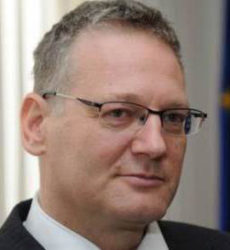Head of the European Union (EU) Delegation to Guyana Jernej Videtič last evening called once more for government to abolish the death penalty, decriminalise same sex intimacy and to strengthen efforts to combat domestic abuse and trafficking in persons.
“The European Union has a strong commitment to gender equality, the empowerment of women and girls, and the eradication of gender-based violence,” Ambassador Videtič also said last evening at a reception hosted by EU at the National Cultural Centre to celebrate “Europe Day.”
He told the gathering that the EU has supported a number of initiatives in this area in Guyana in recent years, including providing financial support to organisations dealing with domestic abuse, such as Help and Shelter, Merundoi, ChildLink and the Child Care and Protection Agency.
Ambassador Videtič, like his predecessors, has previously issued public calls for government to abolish the death penalty and decriminalise same sex intimacy.

He also mentioned some of the development projects in which the EU has partnered with government. “We also cooperate politically, including through a formal mechanism of political dialogue. Through dialogue we explore commonalities; areas where we can work together to achieve our common aims,” he said.
Ambassador Videtič noted that 2016 is a very important year globally as on April 22, the Paris Climate Agreement was signed by 175 countries, including Guyana. “In the negotiations for this agreement, the European Union was a strong voice for ambition and we formed a strong alliance with the group of African, Caribbean and Pacific states, of which Guyana is, of course, a member,” he said.
He said that another very important recent event is the United Nations Sustainable Development Summit, which decided on the Post-2015 Agenda. Guyana, he said again played a prominent role in the preparations for this summit.
Ambassador voiced his certainty that “the strong value-based partnership between the European Union and Guyana will continue to advance our mutual principled and responsible efforts towards climate change, human rights, political, economic, and social development and many other issues.”
He also used the occasion to congratulate the government on taking office and for holding the historic local government elections, which were run off for the first time in over two decades.
Meanwhile, also speaking at the event was President David Granger, who noted that the EU is one of Guyana’s main trading partners as it accounting for exports, valued some €192 million, from the country.
In brief remarks, the president said that the €192 million export figure represented about 15 % of Guyana’s exports in 2013 alone. He said that Guyana’s imports from the EU were valued at €122 million.
According to Granger Guyana has been a beneficiary of cooperation with the European Union in agriculture, education, food security, governance, health, hinterland development, aviation and maritime infrastructure and sea defence and coastal zone management.
He said that the European Union remains, also, a valued development partner in the Caribbean.
The Joint Caribbean-EU Partnership Strategy, concluded in 2014, forms a basis for continued responsiveness to development challenges and opportunities, he said, while adding that in this regard, Guyana welcomes the European Union’s assurances of dialogue and consultations with the Caribbean region on the issue of the EU’s implementation of its External Strategy for Effective Taxation as part of its Anti-Tax Avoidance Package.
Granger told the sizeable gathering, which included members of the government, opposition and the diplomatic community, that Europe Day 2016 is a beacon to all nations. “It shows that the path to peace and sustained security. It indicates that this path begins with deepening the integration process and with increasing emphasis on international cooperation,” he said.
European integration, he said also, has been an instrument for deepening and widening cooperation with countries and other regions of the world.





